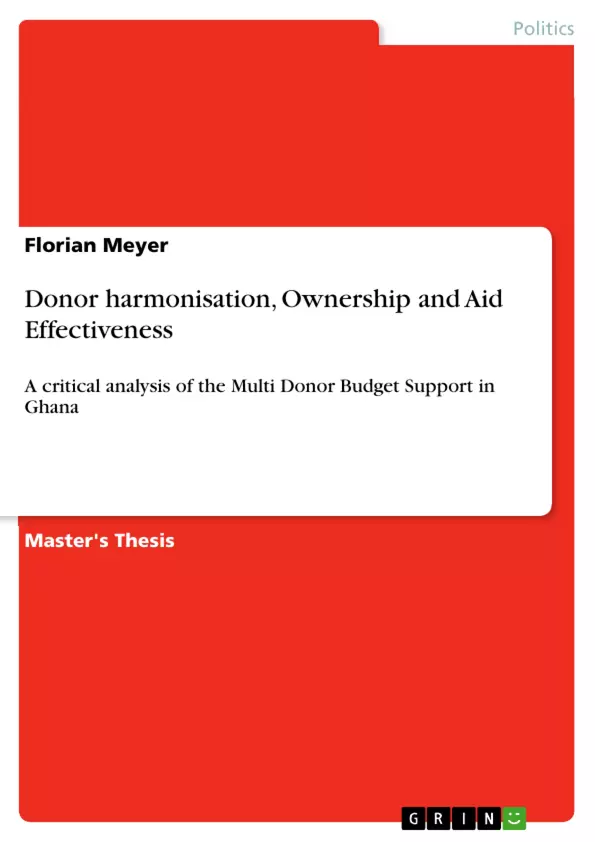This paper deals with the aid instrument budget support and discusses its strengths and weaknesses in terms of the expected effects of the instrument in areas such as donor harmonisation, ownership, aid effectiveness and accountability. By presenting the international context in which the rise of program-based approaches, such as budget support, took place and by summarizing the actual debate about the instrument and its effectiveness, the paper elaborates a set of assumptions and hypothesises which are affecting the overall performance of the instrument and have to be addressed based on the specific country context. In consequence, it examines and tests these assumptions by critically analyzing the Multi Donor Budget Support in Ghana based on a field study conducted in Accra in July 2010. The central argument of the paper is that general budget support can be one of the most effective aid instruments available at the time, as long as problems inherent to the instrument are addressed and tackled to prevent negative side effects. It comes to the conclusion that the MDBS in Ghana, although there is still room for improvement and entry points for critique, is a functioning example on how to acknowledge and implement the principles of the Paris Declaration on Aid Effectiveness and the Accra Agenda for Action. Especially the quality of the policy dialogue and initiatives taken to avoid negative side effects in areas such as domestic as well as mutual accountability and ownership could become valuable examples for others to follow.
Inhaltsverzeichnis (Table of Contents)
- Preface
- Literature Review
- The international context
- The rise of budget support
- The actual debate
- The Multi Donor Budget Support in Ghana – An analysis
- Operational structure
- Achievements and challenges
- Budget support, project aid and public financial management
- Donor harmonisation, bilateral bypassing and the flexibility of the instrument
- Conditionality, ownership and domestic accountability
- Other challenges and risks
- Conclusion
Zielsetzung und Themenschwerpunkte (Objectives and Key Themes)
This paper critically analyzes the effectiveness of the Multi-Donor Budget Support (MDBS) in Ghana, focusing on its role in promoting donor harmonization, ownership, aid effectiveness, and accountability. By examining the instrument's theoretical underpinnings and its practical application in the Ghanaian context, the paper aims to shed light on the strengths and weaknesses of budget support as an aid mechanism.- The rise of program-based approaches (PBA), particularly General Budget Support (GBS), and its impact on traditional development aid models.
- The interplay between budget support, project aid, and public financial management in promoting development.
- The challenges and opportunities associated with donor harmonization, ownership, and accountability in the context of MDBS.
- The effectiveness of budget support in achieving development goals and the importance of addressing inherent challenges to maximize its impact.
Zusammenfassung der Kapitel (Chapter Summaries)
This chapter provides a brief overview of the international context surrounding the rise of budget support. It outlines the evolution of development aid practices, highlighting the key principles of the Paris Declaration on Aid Effectiveness and the Accra Agenda for Action (AAA) that have shaped the contemporary approach to development cooperation. The chapter sets the stage for a deeper analysis of the instrument by examining the underlying rationale and objectives guiding the shift towards program-based approaches. This chapter delves into the operational structure and functioning of budget support. It explores the theoretical underpinnings of the instrument, examining how it is designed to work and the principles guiding its implementation. The chapter analyzes the rationale behind the growing preference for budget support over traditional project aid, outlining the benefits and potential challenges associated with this approach. This chapter provides a comprehensive analysis of the MDBS in Ghana, examining its strengths and weaknesses. It explores the operational structure of the MDBS, examining how it is implemented and the key actors involved. The chapter delves into the specific challenges and successes of the MDBS, focusing on its impact on donor harmonization, ownership, and domestic accountability. It also explores the potential risks associated with budget support and the importance of mitigating these risks through effective implementation strategies.Schlüsselwörter (Keywords)
This paper focuses on key concepts such as budget support, donor harmonization, ownership, aid effectiveness, accountability, and the Multi-Donor Budget Support (MDBS). It examines the theoretical underpinnings of program-based approaches (PBA) in development aid and critically analyzes the MDBS in Ghana, drawing insights from a field study conducted in Accra. The paper highlights the importance of addressing challenges inherent to budget support to maximize its effectiveness and achieve sustainable development goals.Frequently Asked Questions
What is Multi-Donor Budget Support (MDBS)?
MDBS is an aid instrument where multiple donors provide funds directly to a partner country's national budget to support its development strategy.
What are the strengths of budget support in Ghana?
It promotes donor harmonization, increases national ownership of development policies, and strengthens public financial management systems.
What is the Paris Declaration on Aid Effectiveness?
An international agreement aimed at improving the quality of aid through principles like ownership, alignment, and mutual accountability.
What are the challenges of MDBS in Ghana?
Challenges include managing conditionality, ensuring domestic accountability, and avoiding "bilateral bypassing" where donors fund separate projects.
How does budget support affect accountability?
Ideally, it strengthens domestic accountability by making the government answerable to its own parliament and citizens for the use of funds.
- Quote paper
- Florian Meyer (Author), 2010, Donor harmonisation, Ownership and Aid Effectiveness , Munich, GRIN Verlag, https://www.grin.com/document/163566



